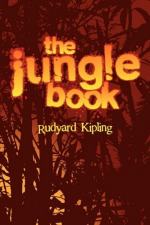“Yes,” said Little Toomai, “he is afraid of me,” and he took long strides up to Kala Nag, called him a fat old pig, and made him lift up his feet one after the other.
“Wah!” said Little Toomai, “thou art a big elephant,” and he wagged his fluffy head, quoting his father. “The Government may pay for elephants, but they belong to us mahouts. When thou art old, Kala Nag, there will come some rich rajah, and he will buy thee from the Government, on account of thy size and thy manners, and then thou wilt have nothing to do but to carry gold earrings in thy ears, and a gold howdah on thy back, and a red cloth covered with gold on thy sides, and walk at the head of the processions of the King. Then I shall sit on thy neck, O Kala Nag, with a silver ankus, and men will run before us with golden sticks, crying, `Room for the King’s elephant!’ That will be good, Kala Nag, but not so good as this hunting in the jungles.”
“Umph!” said Big Toomai. “Thou art a boy, and as wild as a buffalo-calf. This running up and down among the hills is not the best Government service. I am getting old, and I do not love wild elephants. Give me brick elephant lines, one stall to each elephant, and big stumps to tie them to safely, and flat, broad roads to exercise upon, instead of this come-and-go camping. Aha, the Cawnpore barracks were good. There was a bazaar close by, and only three hours’ work a day.”
Little Toomai remembered the Cawnpore elephant-lines and said nothing. He very much preferred the camp life, and hated those broad, flat roads, with the daily grubbing for grass in the forage reserve, and the long hours when there was nothing to do except to watch Kala Nag fidgeting in his pickets.
What Little Toomai liked was to scramble up bridle paths that only an elephant could take; the dip into the valley below; the glimpses of the wild elephants browsing miles away; the rush of the frightened pig and peacock under Kala Nag’s feet; the blinding warm rains, when all the hills and valleys smoked; the beautiful misty mornings when nobody knew where they would camp that night; the steady, cautious drive of the wild elephants, and the mad rush and blaze and hullabaloo of the last night’s drive, when the elephants poured into the stockade like boulders in a landslide, found that they could not get out, and flung themselves at the heavy posts only to be driven back by yells and flaring torches and volleys of blank cartridge.
Even a little boy could be of use there, and Toomai was as useful as three boys. He would get his torch and wave it, and yell with the best. But the really good time came when the driving out began, and the Keddah—that is, the stockade—looked like a picture of the end of the world, and men had to make signs to one another, because they could not hear themselves speak. Then Little Toomai would climb up to the top of one of the quivering stockade posts, his sun-bleached brown hair flying loose all




